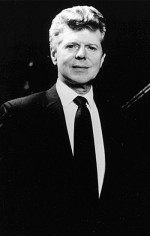Title
On March 3, close to 1,500 of Van Cliburn’s closest friends gathered in the magnificent Broadway Baptist Church in Fort Worth to bid farewell to a legend and an era. They had lost the man who symbolized all that made them proud, a man whose achievements and attributes made them believe in the sanctity of the human spirit and of music. There wasn’t a dry eye as the 300-voice choir and the Fort Worth Symphony filled the air with the sound of hymns, Russian songs, and Rachmaninoff’s music.
Body
I was 10 years old, living in Israel, when my father burst into my room one day pointing to the front page of the newspaper. “Look!” he said with amazement and excitement, “an American won the gold medal in the Tchaikovsky competition in Russia!” Overnight, Cliburn became the free world’s hero. He taught us that music transcends politics, transcends geographic and ethnic boundaries. He taught us that one human being could have the capability of thawing a Cold War. He made us all proud of who we were.
When I finally met him, about 15 years ago, I felt like I had known him all my life. Here was a man who achieved more fame than any musician I knew, who played for every president since Truman, and who still received a hero’s welcome in Moscow 50 years after winning that prize. And yet, his humility, warmth, and self-effacing nature were completely unaffected. He greeted everyone with hugs, enthusiasm, and a genuine “I am thrilled to see you!” To the end, he stood tall, erect, and dignified. In the words of one of his Juilliard schoolmates, he never had a bad thing to say about anyone, and he never had a good thing to say about himself. He didn’t claim any of his triumphs as his own; he was quick to say that they were all triumphs of classical music, and that he was just the messenger.
I will forever cherish the time I spent with this unique, wonderful man. Music, particularly opera, always brought tears to his eyes. He would grab your arm and say with overwhelming emotion: “Listen! Isn’t this beautiful? It’s divine!” His love and appreciation for his parents was touching, and his unbelievable memory yielded fascinating stories from a rich and exceptional life. He remained an avid supporter of Juilliard throughout his life, and during a recent tour of the building, his face kept lighting up as he said, “Do the students know how fortunate they are?” His infectious laugh made you forget any worries you may have had, and to this day, I cannot listen to the Rachmaninoff Third Piano Concerto without remembering his recording and getting goose bumps all over again.
When you got to know Van, it was easy to see why Moscow fell in love with him. It was easy to see how he became a pillar of Fort Worth society and why he devoted his efforts to the advancement of future pianists through the Van Cliburn Competition and Foundation. It was difficult to walk out of that church on that warm and sunny day in March into a city diminished by his absence. I watched the hundreds of people filing out teary-eyed and was filled with the hope that he infused enough people with his music and his personal values for his legacy to live on forever.






